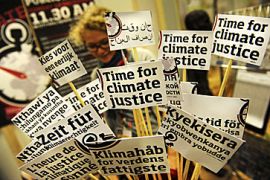Leaked climate draft sparks anger
Danish proposal for political agreement threatens to derail Copenhagen talks.

Developing nations taking part in the United Nations climate change conference in Copenhagen have criticised a leaked document which proposes that more power be granted to rich nations.
The document, which was leaked on Tuesday by The Guardian, a British newspaper, also suggests that the UN’s negotiating role should be sidelined and that the legally-binding Kyoto protocol be abandoned.
Keep reading
list of 4 itemsAfter the Hurricane
World’s coral reefs face global bleaching crisis
Why is Germany maintaining economic ties with China?
The Guardian reported that the text was drawn up by representatives of a small group of rich nations. The US, UK and Denmark are thought to be among those involved in the drafting of the proposals.
| in depth |
|
|
Developing countries have said that the text is part of a plan by rich nations to set unequal limits on carbon emissions in 2050, according to a confidential analysis of the proposals that The Guardian also obtained.
Alan Fisher, Al Jazeera’s correspondent in Copenhagen, said leaks are made because people want to make certain positions public.
“There are two possible reasons for the leak. One is that Western nations were saying – this is our bottom line, these are the draconian measures we are prepared to take to safe-guard our interests,” Fisher said.
“Or it could have been the developing nations saying – if you are even considering anything like this, there is going to be a revolt you have never seen the like of before.
“The Danes are not denying that the document exists, but they are saying it doesn’t carry any official weight at all.”
Unequal emissions target
The analysis says that the text worked on by rich nations is a strategy to get developing countries to agree to specific emission cuts, the newspaper reported.
The text seeks to set a limit on developing nations that would not allow them to emit more than 1.44 tonnes of carbon per person by 2050 – while developed nations will be allowed to discharge 2.67 tonnes per head.
The draft is also understood to call for handing control of climate change finance to the World Bank.
Waldon Bello, the director of “Focus on the Global South”, a non-governmental organisation specialising in policy research, said that the text was evidence of a “betrayal” on the part of rich nations.
“This is a terrible document – the idea that there would be differential limits put on emissions to favour the north [and] the fact that there would be abandonment of the only legitimate framework, which is the Kyoto Protocol,” he said.
“This is not what developing countries were expecting. They were expecting the north to make a serious offer and this is definitely not a serious offer at this point in time. This shows that there is just no ‘give’ when it comes to the north.”
Funding gap
On the same day that the text was leaked, a senior Chinese negotiator told reporters in Copenhagen that the US’s emissions target was not notable, that the EU’s was not enough, and that Japan’s came with impossible conditions.
He also criticised talk of developed nations contributing $10bn annually to poor countries to help them cope with climate change, saying that more money is needed.
 |
| The US, UK and Denmark are thought to be involved in drafting the document [AFP] |
Estimates of how much it would costs to enact a climate change plan vary widely.
Nicholas Stern, the British government adviser on climate change, says developing countries could use $130bn dollars per year.
The bulk of it, $75bn, would be spent on coping with the effects of climate change, with another $40bn going towards research and development of greener technologies and $15bn for forest conservation.
Those estimates are much lower than those given by the World Bank, which reports that poor countries would need $550bn dollars a year – including $400bn for technology development and $150bn to cope with the effects of climate change.
If global temperatures are to rise no more than two degrees Celsius by 2050, the International Energy Agency says $10 trillion of energy-related investments will have to be made over the next two decades.
